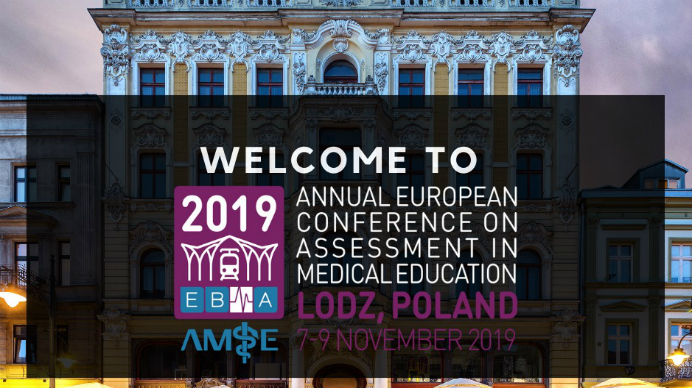
Most of the universities members of the European Board of Medical Assessors (EBMA) are taking part in the pilot application of the Practicum Script clinical reasoning simulator for medical students and the last annual conference, held last weekend in Lodz (Poland) , confirmed the positive progress of the project. Ghent, the Imperial College London and Exeter, among other medical schools, showed their full support for the multicentre study that is about to start its implementation phase. In short, EBMA 2019, co-organized by the Association for Medical Schools in Europe (AMSE), brought new perspectives to the discussion on the development and implementation of assessment strategies in health professions.
Lodz - November 12 , 2019. The Practicum Institute attended the EBMA annual conference on assessment in medical education and presented results about the ongoing pilot project for medical students known as Practicum Universities. Drs Eduardo Pleguezuelos, Academic Secretary of Practicum, and Prof Amir H. Sam, Head of Curriculum and Assessment at the Imperial College London, led a couple of sessions about the benefits of Practicum Script to enhance medical students’ clinical reasoning skills and their ability to manage uncertainty. Both agreed that “there is a growing demand for better assessment of decision-making processes at the undergraduate level.”
Practicum Script is an online simulation-based platform that offers an innovative approach to the development of clinical reasoning skills of medical students, whit the goal of introducing critical thinking in training. It poses real clinical cases that are both challenging and dilemmatic to evaluate how the users apply knowledge to solve complex daily cases. “Single best answer’ questions are widely used in undergraduate and postgraduate assessments, expert opinions vary though; the sooner students assimilate medical uncertainty, the better for their future performance”, argued Prof Sam. “Patients -he added- are unlikely ever to get to a consulting room and give three or four possible diagnoses for their symptoms!”
According to Dr Pleguezuelos, “Practicum Script shortens the experiential learning time and now we’re ready to test it in medical students”. The assessment material, created by an editorial board from the Imperial College London, comprises 20 internal medicine cases reviewed by an international reference panel from 15 different universities. For each clinical scenario, final year medical students will need to generate hypotheses in free-text format and provide justifications by identifying positive or negative findings in the case. Additionally, students will be asked to report how new information affects their original hypotheses. “The feedback for them will be based on experts’ answers along with evidence from the lilterature", explained Dr Pleguezuelos.
Assessment for learning
“The point is to embrace the gray scale of clinical decisions and for this purpose, the tool allows interactions among learners and provides a reflective portfolio”, remarked Prof Sam. He and Dr Pleguezuelos share the opinion of the currently limited variety of cases and coaching offered to students. The aim of this pilot project is to develop applied research related to the implementation of Practicum Script for senior medical students in order to assess the feasibility of the simulator for formative longitudinal assessment purposes. Actually, Practicum Script could be a valuable tool as a formative assessment to monitor the growth of clinical reasoning skills and, at the same time, the results of longitudinal formative tests could be translated into a summative decision.
Transformative assessment standards are crucially important for ensuring that medical education meets the needs of future health care. Concurrent sessions during the conference covered a wide range of topics on programmatic assessment, OSCEs, progress testing, and very short answer questions. Our approach focuses on the research of cognitive processes involved in clinical decision-making aligned with the current concepts of neurosciences and cognitive psychology. “It’s time to consider integrating a clinical reasoning competence into medical schools´ curriculum and Practicum Script could contribute meaningfully to this goal, remarked Dr Pleguezuelos.
Our personalized help center enables you to obtain technical support and help for navigating through the site and using the program.